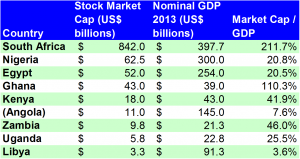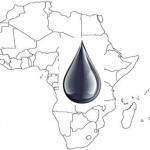 Bloomberg had a story out late last week about plans for an Angola Stock Exchange, entitled, “Angola Plans 6th-Biggest Africa Bourse With Value at 10% of GDP”. Since we (and by we, I mean you and me, in an apparently small minority) are resolved to have a realistic approach in discussing economic prospects anywhere, here are the main points of interest from the article once we strip away all the spin and optimism:
Bloomberg had a story out late last week about plans for an Angola Stock Exchange, entitled, “Angola Plans 6th-Biggest Africa Bourse With Value at 10% of GDP”. Since we (and by we, I mean you and me, in an apparently small minority) are resolved to have a realistic approach in discussing economic prospects anywhere, here are the main points of interest from the article once we strip away all the spin and optimism:
- Angola, Africa’s second-biggest oil producer, expects its stock exchange to have a market value of 10 percent of gross domestic product within 18 months of its startup, making it at least the continent’s sixth biggest.
- The capitalization of the exchange, set to start in 2015, would be a minimum of $11 billion based on last year’s output of $114 billion.
- The Angolan government is forecasting economic growth of 7.1 percent this year, down from 7.4 percent in 2012.
- A secondary bond market will start this year to help develop a yield curve.
- South Africa’s bourse is the continent’s largest at $842 billion, more than double its GDP.
- Angola ranks 157th out of 176 countries on Transparency International’s 2012 Corruption Perceptions Index.
The investment bank Imara just put together this brief which summarizes some key data points for other stock markets in Africa. There’s some good trading info in there but missing is any indication of market capitalization figures. I should add that this isn’t Imara’s fault necessarily as this data is generally pretty hard to come by.
The thing is, this isn’t the first time Angola has made efforts at opening a stock exchange. In December 2007, allAfrica.com ran a story entitled, “Angola: Stock Exchange Opens in 2008”, but I definitely remember hearing about this before then, though not as far back as 2003, which is when this article dates the beginning of the process.
In any event, here’s a more “recent” take on the Angola stock exchange prediction, from How We Made It In Africa in 2010. Apparently, Angola’s planned exchange was then expected to be the third largest in Africa. Particularly striking from the 2010 article was this little snippet:
Continue reading







